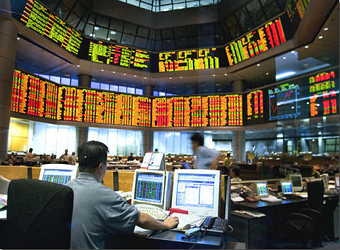Asia markets finished mostly lower on Friday, as Samsung Group shares were in focus following the arrest of its chief.
Jay Y. Lee was arrested early on Friday over his alleged role in a corruption scandal that led parliament to impeach President Park Geun-hye, according to Reuters.
Samsung and Lee have denied wrongdoing in the case.
In a statement after the arrest, a Samsung spokesperson said: “We will do our best to ensure that the truth is revealed in future court proceedings.”
Shares of the flagship business, Samsung Electronics, closed down 0.4 percent at 1,893,000 Korean won. (The won traded at 1,145.95 against the dollar.)
Shares of Samsung SDI climbed 0.8 percent, Samsung Electro-Mechanics was up 0.7 percent, Samsung C&T was off by two percent and Samsung Engineering fell 1.2 percent.
Analysts told CNBC on Friday that Lee’s arrest is unlikely to have an impact on Samsung’s global brand.
Fitch Ratings added in a note that the news had no immediate impact on Samsung Electronics’ credit rating, but said it could negatively affect investor sentiment in the short term.
“As Samsung Electronics’ (SEC) credit profit is based on its fundamentals and strength of its businesses, negative sentiment on SEC could be offset by the company’s solid performance,” Fitch said.
The broader South Korean market was mixed, with the Kospi finishing near flat at 2,080.58 and the Kosdaq climbed 2.12 points, or 0.34 percent, to 618.70.
Elsewhere, Japanese shares were lower, with the Nikkei Stock Average closing down 112.91 points, or 0.58 percent, to 19,234.62 and the Topix fell by 6.53 points, or 0.42 percent, to 1,544.54.
Japanese electronics company Sharp beat the broader index to close up 2.80 percent at 331 yen, after the company revised its earnings estimates.
In a filing on Friday, Sharp said it expected operating income for the year ending March 31, 2017, to be 47.4 billion yen, up from its previous forecast of 37.3 billion yen.
Sharp also trimmed its expected losses for the year to 27.1 billion yen from an earlier forecast of 37.2 billion yen.
Meanwhile, Toshiba shares tumbled 9.23 percent to 184 yen, extending losses from previous sessions.
Over the past four sessions, Toshiba shares have fallen more than 27 percent since a peak at the start of the week, touching a session low of 178 yen on Friday.
The TVs-to-nuclear conglomerate has been scrambling for cash to stay in business, after booking a $6.3 billion hit to its U.S. nuclear unit, according to reports.
Reuters- citing a source- reported this week that Toshiba may delay the sale of its prized flash-memory chip unit after it said it would consider selling most, even all, of the marquee business.
Australia’s benchmark ASX 200 closed down 10.49 points, or 0.18 percent, at 5,805.81.
Major resource producers Down Under were off by more than one percent each. Shares of Rio Tinto fell 2.14 percent; Fortescue was off by 2.41 percent and BHP Billiton declined by 1.11 percent.
In Hong Kong, the Hang Seng index was off by 0.50 percent. Chinese mainland shares were lower, with the Shanghai composite closing down 27.65 points, or 0.86 percent, to 3,201.96 and the Shenzhen composite fell 13 points, or 0.66 percent, to 1,945.10.
The session in Asia followed a slightly lower finish in the U.S. on Thursday.
Mizuho Bank currency strategist Weiliang Chang said while U.S. President Donald Trump had been a boost to business sentiment, markets were now more concerned whether there will be a strong follow-through on the policy front.
The dollar index, the greenback against a basket of currencies, slipped to trade at 100.62 from levels above 101.6 reached earlier in the week.
“The constant rebuff on dollar rallies is a worrying sign that the market may be favoring positioning for a sudden wave of risk aversion,” Stephen Innes, a senior trader at OANDA, said in a note.
“Apparently, political jitters continue to override strong underlying economic sentiment in this current climate,” Innes added.
The yen traded at 113.31 to the dollar at 4:14 p.m. HK/SIN, strengthening from levels above 114 earlier in the week, but weaker than an earlier session high of 113.13.
The relatively stronger yen sent most Japanese exporters lower, with Toyota shares closing down 0.88 percent, Mitsubishi Electric off by 1.55 percent, while Sony fell 0.37 percent.
The Australian dollar fetched $0.7693 at 3 p.m. HK/SIN, up from an earlier low of $0.7680.
“The Australian dollar remains very well supported as the reflation dynamics continue to run high, with both China and U.S. inflation indexes printing higher than expected,” Innes said.
He continued that the Aussie had been in real demand this week on the back of the reflation trade and could likely be somewhat “overextended.”
“We may see further profit-taking and positions squaring as dealers opt to keep weekend risk nimble,” he added.
Oil prices climbed in Asian trade on Friday, with U.S. crude futures gaining 0.17 percent to $53.45 a barrel, while global benchmark Brent was up 0.22 percent to $55.77.
Source: CNBC
